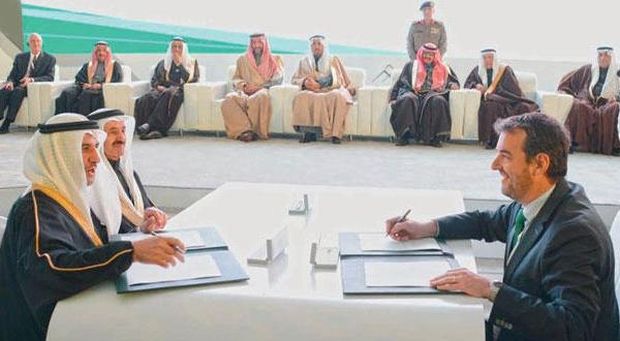
Officials sign an agreement on the King Abdullah Wa’ad Al-Shamal City project on February 4, 2014. (Saudi Press Agency)
Riyadh, Asharq Al-Awsat—The world’s largest mining project, the King Abdullah Wa’ad Al-Shamal City, officially launched on Tuesday, drawing in some 36 billion Saudi riyals (9.6 billion US dollars) in investments and agreements.
The agreements included deals to construct a number of factories and roads, as well as a 1,000-megawatt power plant at the city, which will be used to exploit gas and phosphate reserves in the under-utilized Northern Borders region, which is also the Kingdom’s most underpopulated.
Prince Abdullah Bin Abdulaziz Bin Mesa’id, who oversees the region, said it would create investment opportunities for residents, contributing to its stability and development.
Present at the launch, Minister of Petroleum and Mineral Resources Ali Al-Nuaimi said that one of the most important outcomes of the project would be the training of qualified workers to contribute to industrial development in Saudi Arabia.
The project is part of government plans to achieve balanced and sustainable development and economic diversity in the Kingdom.
Minister of Finance Dr. Ibrahim Al-Assaf pointed to the country’s North Railway Project, a plan to link the Northern Borders region with other areas of the country, which he said would play a major role in encouraging industrial companies to establish new facilities there. He said the new railway would provide transport to and from the City, encouraging migration to the area once infrastructure was completed and employment opportunities had been created.
Minister of Transport Jabara Bin Eid Al-Suraiseri said the ministry will also establish a number of other transport projects to contribute to the development of the region and achieve balance between all the Kingdom’s regions. These include linking the City with Saudi ports along the Arabian Gulf, a project developed in conjunction with China Harbour Engineering Company.
As part of the investments, a 24 billion Saudi riyal (7.5 billion dollar) agreement was signed between the Saudi Arabian Investment Company (Sanabel Investment) and SunEdison to fund a feasibility study of a proposed joint venture for the establishment of an integrated industrial complex to produce poly-silicon, energy products and solar panels at the project, in collaboration with the Ministry of Petroleum and Mineral Resources.
The project will directly create some 6,300 jobs at the City.
The Ministry of Petroleum and Mineral Resources also signed an agreement with the Water and Electricity Ministry represented by the National Water Company to study the possibility of developing and treating waste water in the northern region, in order to provide cooling water and industrial water to the city.
Mohamed Al-Madi, vice chairman and CEO of the Saudi Basic Industries Corporation (SABIC), one of the companies contracted for the project, said SABIC “sees investment in Wa’ad Al-Shamal to be compatible with its strategic plan for 2025, which includes the fertilizer sector in both its subdivisions, nitrogenous and phosphate,” adding that “the fertilizer industry is a mainstay in global food security and a major factor in national agricultural development.”
President and CEO of Saudi Aramco Khalid Al-Falih said gas exploration operations in the northeast of Saudi Arabia resulted in new discoveries of gas in this region, which will enable a threefold increase in the Kingdom’s available supply.

Trackbacks/Pingbacks